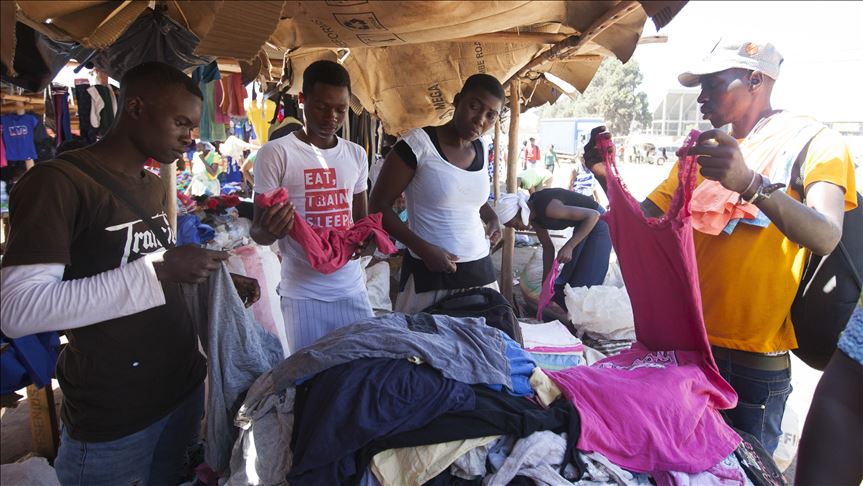
HARARE, Zimbabwe
"Dollar for two!" exclaim street vendors in discordant voices as customers rummage through heaps of second-hand clothes spread across every available space in a mass vendors' mall in the Zimbabwean capital, Harare.
Customers can buy at least two pieces of second-hand clothing with a single U.S. dollar, as selling has become increasingly popular for dealers like 41-year old Madeline Chihota, who now runs several market stalls.
"I own eight market stalls in the CBD [Central Business District] alone and several others just outside the city in places like the Mbare Township and at these market stalls, I specialize in selling second-hand clothes," Chihota told Anadolu Agency.
Chihota said that on a good day, she earns approximately $600 in sales from second-hand clothes.
Failing economy, booming sector
As the rest of Zimbabwe battles an ailing economy, businesses like Chihota's have flourished.
"People can no longer afford to buy new clothes," she explained, with second-hand vendors becoming the "alternative boutiques for the suffering masses."
Inflation in Zimbabwe hovers at around 300%, according to the International Monetary Fund, with trade union reports showing unemployment above 90%.
Creating jobs
With unemployment ballooning in the country, many second-hand clothes dealers have contributed to creating jobs.
Even some development experts, like Menzisi Gumbo, have welcomed the second-hand apparel sector.
"It’s a fact that selling second-hand clothes is supporting the lives of thousands of Zimbabweans. Stall owners selling second-hand clothes now employ hundreds of people, some as runners touting clients, screaming out brands of the clothes on sale and singing at the top of their voices, dancing as they advertise the clothes," Gumbo told Anadolu Agency.
Despite this, few Zimbabweans can afford to buy even second-hand clothes, which are sold in U.S. dollars, as vendors shun the defunct local currency.
An average government school teacher earns a monthly wage equivalent to $88 -- approximately 1,500 Zimbabwean dollars.
So, for an average Zimbabwean government worker like a teacher, even turning to second-hand clothes on the streets remains a luxury, according to teacher and official Robson Chere.
Yet, for Chere too, "walking into shops to buy new clothes has become a preserve only for the rich as inflation gallops out of control."
But even as people struggle to find the U.S. dollars required to buy most second-hand clothes, the second-hand clothes market has grown extensively.
Durability
To fashion experts like Linda Muchinjo based in Masvingo, Zimbabwe's oldest city, "second-hand clothes which are smuggled into the country from countries like Mozambique have become shoppers' preferred choice when buying durable wares."
As such, hit with poverty, poor Zimbabwean mothers like 42-year old Sandra Shumba from Mabvuku, a high-density suburb east of Harare, have even resorted to buying second-hand offal wear for her six daughters because she cannot afford new ones found in shops.
"I have no money for new clothes, and there is absolutely nothing I can do. I buy second-hand underwear for my daughters from vendors specializing in second-hand clothing and life goes on, my daughters are happy," Shumba told Anadolu Agency.
Huge profits
Even as customers buy second-hand clothes at bargain prices, for many dealers like Chihota, the returns on the business are "incredible."
"For instance, a bale of clothes worth $100 will earn $1000," Chihota said, adding that these profits were simply "too good to forego."
With the second-hand boom, many shop owners like Denis Mavenzenge, who is based in Zimbabwe-Mozambique border town Mutare, have resorted to stocking up on second-hand wares themselves to sell in their shops.
"I have seen most of the second-hand clothes, are of high quality and durable. Now, my workers must often select merchandise from second-hand bales of clothes as they arrive from Mozambique, washing and ironing them, then folding and packing them in the shop before we sell at much higher prices," Mavenzenge told Anadolu Agency.
Anadolu Agency website contains only a portion of the news stories offered to subscribers in the AA News Broadcasting System (HAS), and in summarized form. Please contact us for subscription options.







